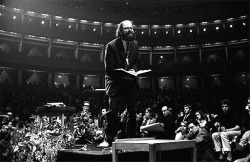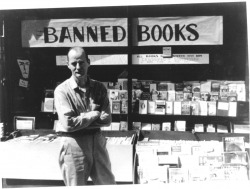The Beat Poets

At Top: Lawrence Ferlinghetti outside of his "City Lights Bookstore" in San Francisco, where he refused to adhere to the banning of books.
At Left: Allen Ginsberg at a poetry reading.
Irwin Allen Ginsberg: June 3, 1926-April 5, 1997. He was an American "Beat" poet born in Newark, New Jersey. His best known work is "Howl" (1956), a long poem about "consumer society's negative human values". He was politically active; he was also gay.
He was born to a Jewish family; his father Louis was a poet and his mother Naomi was a high school teacher; she was afflcited with epileptic seizures and mental illnesses (such as paranoia) . She was an active member of the Communist Party and often took her children to meetings.
In his teen years, he began to write letters to the "New York Times" about political issues such as WWII, worker's rights, etc. It was also at this time that he began reading Walt Whitman and was very influenced by his works. One event that shaped his life was going with his mother to her therapist (he was in Jr. High at the time). This disturbed him, and he recounted the session and the relationship with his mother in his long, autobiographical poem "Kaddish for Naomi Ginsberg (1894-1956)". He spent 8 months in a mental institution himself, where he met Carl Solomon-- this is the Carl referred to in "Howl".
He graduated HS in 1943 and went on to Montclair Sate University then Columbia University (on scholarship). In his freshman year there, he met Lucien Carr, who introduced him to future beat writers including Jack Kerouac, William S. Burroughs, and Neal Cassady... Ginsberg loved Cassady, and in Keroac's famous 1957 novel "On the Road", he describes their meeting. In 1954, Ginsberg met Peter Orlovsky, who was 21 at the time; they fell in love and remained life-long lovers. They became interested in Tibetan Buddhism, which also shaped his work.
Ginsberg, through his career, would "form a bridge between the beat movement of the 1950's and the hippie culture of the 1960's"; some of his friends were Timothy Leary, Gregory Corso, Ken Kesey, and Bob Dylan. In 1965, he was deported from Cuba for publicly protesting against their anti-marijuana stance and for their policy of jailing homosexuals; he also referred to the revolutionary Ernesto "Che" Guevera as "cute". The Cubans sent him to Czechoslovakia where he was labeled a "moral menace" and deported.
He remains an inspiration to musicians and poets alike. In 1982, he was featured on "Ghetto Defendant", a song by The Clash. Rage Against the Machine often performed "hadda be Playin' on a Jukebox" (a Ginsberg poem) at their concerts... it can be found on their "Live & Rare" album. He is also referred to in the broadway musical "Rent" int he song "La Vie Boheme".
His poetry was storngly influenced by Modernism, Romanticism, Buddhism, his Jewish background, and Jazz. He considered himself the next link in the chain of "homoerotic visionary" from Blake to Whitman-- then on to Ginsberg. William Carlos Williams was another inspiration to Ginsberg. His poetry is powerful, marked by long lines and "searching, probing focus", as well as an "exhuberance" that all echoes the inspirations that he claimed to have.
"Howl" is well-known for its opening line "I saw the best minds of my generation destroyed by madness". It was considered scandelous for the time due to the raw, explicit language of the poem. It was published in 1956 by "City Lights Bookstore", and shortly after, it was banned for obscenity. It was the center of a First Amendment fight that ended in the judge deeming the poem to "possess redeeming social importance", thus the ban was lifted. However, Ginsberg's leftist and anti-establishment politics did not go unnoticed by the government; he was trailed by the FBI who regarded him as a "security threat".
He also played a key role in a famous 1965 Vietnam War protest at Oakland-Berkeley. He wanted to ensure that the protest of several thousand marchers would not be violently interrupted by the notorious motorcycle gang "Hell's Angels" and their leader, Sonny Barger. At a smaller protest the day before, there was tension, and Sonny promised to disrupt the planned march. Ginsberg (along with Ken Kesey) went to Barger's home in Oakland to talk; it is rumored that he offered Barger and the Angels LSD as a gesture of friendship and goodwill. Barger and the Angels were impressed by their courage adn vowed not to atttack the protest the next day.
Early on, Ginsberg would report having "spontaneous visions". A trip to India and a chance encouter on a NYC street with Chogyam Trungpa, a Tibetan Buddhist meditation master who became his life-long friend and teacher, solidified his spiritual beliefs and practices. Chogyam founded Naropa University in Boulder, Colorado, and Ginsberg would help to found the "Jack Kerouac School of Disembodied Poetics" there. Ginsberg's poetry readings were quite remarkable-- and always packed. He accompanied himself on a handheld organ (a harmonium) and somtimes a guitarist; music and chanting were integral parts of his readings. He was popular all over the world.
He won the National Book Award for "The Fall of America". In 1993, the French Minister of Culture awareded him the medal of the Order of Arts and Letters. Throughout the 90's, up until his death in 1997, he remained a political, and gay rights, activist.
He died on April 5, 1997, surrounded by his fmily and friends in his East Village loft in NYC. He succumbed to liver cancer via complications of Hepatitis. He was 70 years old.
Lawrence Ferlinghetti
He was born on March 24, 1919 in Yonkers, NY. He is a poet who is best known as the co-owner of the City Lights Bookstore and publishing house, which published early literary works of the Beat Generation, including Ginsberg and Kerouac.
He is of an Italian-Portugues immigrant family in NY. He atteneded the University of North Carolina at Chapel Hill and served as an officer in the U.S. Navy during WWII. After the war, he got a Master's degree from Columbia University and a doctorate from the Sorbonne in Paris. In Paris, he met Kenneth Rexroth who persuaded him to go to San Francisco to experience the growing literary scene there. From 1951-53, he taught French, wrote literary criticism, and painted. In 1953, he started the bookshop with Peter Martin, and 2 years later when Martin left for NY, Ferlinghetti started the publishing shop, which would specialize in poetry. Of course, the most famous poem they published was "Howl", which would become the subject of a ground-breaking legal case.
He enjoyed nature and had a retreat in a wild area of Coastal California. His "liberal spirituality imbued with kindness" as it is described, inlined him toard friendships with practioners of Buddhism, like Ginsberg. Politically, he described himself as an "anarchist at heart-- but a community-oriented, ethical one" who has come to accept that common humanity is not yet ready to live within anarchism. In turn, he supported a social democracy as modelled in Scandanavian countries (socially liberal).
His best known body of work is a collection of poetry called "A Coney Island of the Mind", which has been translated in 9 languages. In 1998, he was named Poet Laureate of San Francisco. He also continues to paint and exhibit in galleries and museums.
His poetry reflects his views about politics and social issues, and he challenges thoughts about the artist's role in the world.
Bio from the City Lights Bookstore website:
http://www.citylights.com/
A Brief Biography of
Lawrence Ferlinghetti
A prominent voice of the wide-open poetry movement that began in the 1950s, Lawrence Ferlinghetti has written poetry, translation, fiction, theater, art criticism, film narration, and essays. Often concerned with politics and social issues, Ferlinghetti's poetry countered the literary elite's definition of art and the artist's role in the world. Though imbued with the commonplace, his poetry cannot be simply described as polemic or personal protest, for it stands on his craftsmanship, thematics, and grounding in tradition.
Ferlinghetti was born in Yonkers in 1919, son of Carlo Ferlinghetti who was from the province of Brescia and Clemence Albertine Mendes-Monsanto. Following his undergraduate years at the University of North Carolina at Chapel Hill, he served in the U.S. Navy in World War II as a ship's commander. He received a Master's degree from Columbia University in 1947 and a Doctorate de l'Université de Paris (Sorbonne) in 1950. From 1951 to 1953, when he settled in San Francisco, he taught French in an adult education program, painted, and wrote art criticism. In 1953, with Peter D. Martin, he founded City Lights Bookstore, the first all-paperbound bookshop in the country, and by 1955 he had launched the City Lights publishing house.
The bookstore has served for half a century as a meeting place for writers, artists, and intellectuals. City Lights Publishers began with the Pocket Poets Series, through which Ferlinghetti aimed to create an international, dissident ferment. His publication of Allen Ginsberg's Howl & Other Poems in 1956 led to his arrest on obscenity charges, and the trial that followed drew national attention to the San Francisco Renaissance and Beat movement writers. (He was overwhelmingly supported by prestigious literary and academic figures, and was acquitted.) This landmark First Amendment case established a legal precedent for the publication of controversial work with redeeming social importance.
Ferlinghetti's paintings have been shown at various galleries around the world, from the Butler Museum of American Painting to Il Palazzo delle Esposizioni in Rome. He has been associated with the international Fluxus movement through the Archivio Francesco Conz in Verona. He has toured Italy, giving poetry readings in Roma, Napoli, Bologna, Firenze, Milano, Verona, Brescia, Cagliari, Torino, Venezia, and Sicilia. He won the Premio Taormino in 1973, and since then has been awarded the Premio Camaiore, the Premio Flaiano, the Premio Cavour. among others. He is published in Italy by Oscar Mondadori, City Lights Italia, and Minimum Fax. He was instrumental in arranging extensive poetry tours in Italy produced by City Lights Italia in Firenze. He has translated from the Italian Pier Paolo Pasolin’s Poemi Romani, which is published by City Lights Books. In San Francisco, his work can regularly be seen at the George Krevsky Gallery at 77 Geary Street.
Ferlinghetti’s A Coney Island of the Mind continues to be the most popular poetry book in the U.S. It has been translated into nine languages, and there are nearly 1,000,000 copies in print. The author of poetry, plays, fiction, art criticism, and essays, he has a dozen books currently in print in the U.S., and his work has been translated in many countries and in many languages. His most recent books are A Far Rockaway of the Heart (1997), How to Paint Sunlight (2001), and Americus Book I (2004) published by New Directions.
He has been the recipient of numerous prizes, including the Los Angeles Times’ Robert Kirsch Award, the BABRA Award for Lifetime Achievement, the National Book Critics Circle Ivan Sandrof Award for Contribution to American Arts and Letters, the American Civil Liberties Union’s Earl Warren Civil Liberties Award. Ferlinghetti was named San Francisco’s Poet Laureate in August 1998, and he used his post as a bully-pulpit from which he articulated the seldom-heard "voice of the people." In 2003 he was awarded the Robert Frost Memorial Medal, the Author’s Guild Lifetime Achievement Award, and he was elected to the prestigious American Academy of Arts and Letters.

